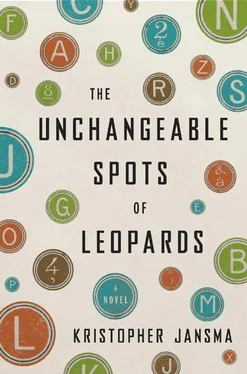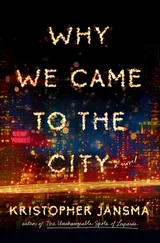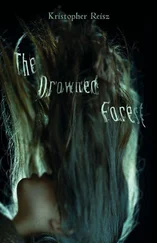“Thing is, I actually wrote, like, a chapter already,” Henry laughs. “But I’d never show it to anyone. It’s so terrible.”
“I’m sure it isn’t,” I lie. This is how it starts — in an hour or so he’ll be asking me to take a look. In another hour, he’ll be asking if my editor might be interested. Tina knew what Jeffrey, and Jeremiah, and I know. The real thing — the true thing — takes more time and effort than most people would ever imagine. Whole productive lifetimes for a few hundred pages that most assuredly won’t outlive us.
“Hey, now. What’s happening out on the lake?” Henry asks.
Clusters of torchlight surround the wide lake, though it is hard to see through the dense rain forest. The wooden plank boats carry more flickering flames.
“The Asantehene arrived,” Kojo explains. “He is the king of the Ashanti.”
“They still have a king ?” Henry laughs. “In this day and age?”
“England still has a queen,” I counter.
Kojo shrugs. “Whatever. They will bring the cow out to the rock in the middle of the lake. They will leave his intestines and guts and whatever out there for the gods, and there will be a feast made out of the rest.”
Kojo won’t stop the car, for fear of what may jump out at us, but through bouncing binoculars I am able to see one highly confused cow, tied up on joined planks, surrounded by men with ceremonial swords. At first it seems to me completely absurd: the men shout and try to avoid the scrambling of the cow, which is either unhappy to be profoundly out of its element or somehow aware of what will become of it out on the approaching rock. But then I wonder how many times, in how many hundreds of years, they have done this. The people on the neighboring boats are jubilant. Soon there will be food, and drums, and dancing — and in a few weeks maybe things will begin to get better. The gods will bring them fish, and they can survive another season. Another year of dry heat followed by rains that will wash their village away. Nothing to worry about — they will build another. And another.
As I suspected, the light in the study is on when we approach the long driveway. I duck so that the old man won’t see me, and then pull Henry down, too, just in case he has decided to do a little night shooting. Henry grins widely. Probably he thinks I’ll mention this in my book, or more probably that I’ll know someone who can get him a book of his own so he can mention it himself.
“Just keep asking him questions,” I say. “And jot it all down in your notebook. Don’t worry if he says things that don’t make sense. He might call you Jeffrey. Just go with it.”
“Finally, some fun,” Henry says with a boyish grin.
I hesitate. “And if he starts playing with his guns, keep an eye on him.”
Henry’s smile shrinks slightly, but I give him a quick laugh and he thinks that I am joking. Guilt begins to creep into my gut, but the idea of sitting on an airplane bound for America by daybreak squeezes it away again. Kojo says nothing but stays with the car, listening to the distant sounds of the ceremony. Not that I have any money left, but if I did, I’d wager that the moment we leave, he’ll head out there to find Efua and Akuba.
I stay in the shadows as Henry enters the lighted kitchen.
“Jeffrey!” the old man’s voice booms. “Come in! I was just packing for my trip.”
It is not difficult at all, walking through the shadows along the side of the house, to get to the back, where the French doors, as always, are wide open. By the time I slip inside I can hear the old man putting a kettle on in the kitchen, and Henry dragging a chair backward across the uneven wooden floor — taking his seat at the table. We are both so close to, finally, taking our seats at the table.
It is even less difficult to find an ornamental knife to pop the drawer open. I’ve seen one often, resting on a bookshelf containing an odd assortment of Great Depression — era plays. Careful not to make too much noise, I slip the knife out of a golden sheath and press it between the drawer and its frame. It slides open with barely a sound.
Inside are a dozen little jars — once containing baby food, according to the labels. Each one is filled with used pen nibs. Jeremiah’s used pen nibs. There must be hundreds of them. Decades’ worth of cracked metal. I lift one up to the moonlight and examine them, like tiny arrowheads. Stained with the inky blood of stories ripped from nothingness and into somethingness.
Reaching behind these, I feel around in the shadows for a sheaf of papers, but my hand closes instead on something hard and smooth. Out comes a bottle, still half filled with liquid, bearing a handmade label — the sort that went out of style thirty years before I was even born. The faded lettering spelled out EPIPHANY BROS. DISTILLERY. GENUINE IRISH WHISKEY. FOUNDED IN 1900. Gently I cradle the bottle in my hand, and I think about the first story of Jeffrey’s that I had ever read. In it, a man on his thirty-third birthday drinks a bottle of Epiphany whiskey out on an Irish moor. It seems like two lifetimes ago. Just two and a half pages. Just nine hundred perfectly chosen words. It had all started there.
For a long time I stand there, staring down at the bottle. In the kitchen I can hear the old man laughing. Henry is doing a bang-up job. I wonder what tall tales the old man is conjuring out of his addled brain now. Slowly I draw the tough knot of cork out of the bottle. I’ve always wondered what it would taste like.
Just as I am about to lift the bottle to my lips, I catch sight of something in the far back of the drawer. It shines in the faint moonlight — a lump of gold about the size of half a human heart. I reach for it, mesmerized.
And then something slams into my leg. And the bottle falls to the floor and I fall to the floor and for a few long minutes I have absolutely no idea what is going on.
• • •
Lying on the floor of the old man’s study, I can feel the wiry hairs of an antelope rug like little needles against my cheek. The antelope is quite dead. It’s been dead for years. Unlike the tense, speculative leopard that crouches in the space between those open French doors, halfway between the jungle outside and the jungle in here. I’m half in and half out, too: not dead yet, but I see no way of living through the next ten minutes. The leopard has gotten a good swipe at the back of my left leg, and I know it must be bleeding all over the floor. And the dead antelope. Though my vision is a little blurry, I seem to be thinking clearly for the first time in weeks, maybe months. Maybe ever.
I don’t dare move, let alone scream. The old man is just in the next room having tea, but if I yelled, I’m sure the leopard could chew my throat out before the old guy even took a step in my direction. The leopard growls, low but lightly. The same sort of inquisitive purring that a housecat might make. Though it is massive, and all muscle, something makes me think that it is just a child. Probably an adult would have killed me outright. Children just want to play and learn how this whole “killing” thing works.
I can’t feel my left arm but it must be just behind my head. I can hear my wristwatch ticking.
All around me are stacks upon stacks: of oft-reread books, of newspaper cuttings, of typewritten pages. None of them are mine. The old man writes in here every morning; sometimes all night long, too. When I first came all the way out to Africa, I hoped that the old man might teach me whatever he had taught Jeffrey. Whatever it was that he had — that he’d always had — that I had always not had. But all the old man ever told me was to write every day. And to read whenever I had the chance. I could have gotten the same advice from a one-hundred-dollar Saturday workshop at the New School. Instead I’ll die out here in the middle of nowhere, my thirty-three years amounting to a useless education, a few pages no one will ever read, and a few girls I loved and who left. Mine turns out to be just a brief, supporting role. A few lines, but nothing memorable.
Читать дальше











